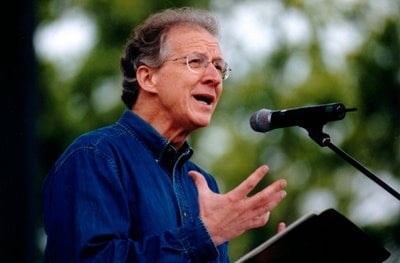Like his hero, Martyn Lloyd-Jones, before him, Dr. Piper does not associate extensively with charismatic ministries, nor does he tend to describe himself as a Charismatic or Pentecostal. In understanding the teaching of both Piper and Lloyd-Jones on this issue, it is important that we do not miss their scepticism of much of the modern charismatic movement. In that, I have to say I do largely agree with both of them.
It seems, at least in this article, that Piper goes further than many today by clearly urging us to not merely be “open but cautious,” but rather to eagerly desire and cry out to God for an impartation of the Holy Spirit and all His gifts.
I strongly recommend the whole article for a carefully-reasoned argument to support a continuationist position written by the greatest preacher/theologian of our time. It is interesting that — at least as far as I remember — this kind of clear trumpet-call to the church today has not yet made it into one of Piper’s published books. But for those willing to spend some time digging at http://www.desiringgod.org/ — or indeed in the archives of my Piper Friday posts — it will become clear that the sentiments of this article are also expressed elsewhere in Dr. Piper’s preaching.
“I am one of those Baptist General Conference people who believes that “signs and wonders” and all the spiritual gifts of 1 Corinthians 12:8-10 are valid for today and should be “earnestly desired” (1 Corinthians 14:1) for the edification of the church and the spread of the Gospel. I agree with the words of Martyn Lloyd-Jones, preached in 1965:
“It is perfectly clear that in New Testament times, the gospel was authenticated in this way by signs, wonders, and miracles of various characters and descriptions . . . . Was it only meant to be true of the early church? . . . The Scriptures never anywhere say that these things were only temporary — never! There is no such statement anywhere.” (The Sovereign Spirit, pp. 31-32)
. . . I want to argue in this section that the New Testament teaches that spiritual gifts (including the more obviously supernatural or revelatory ones like prophecy and tongues) will continue until Jesus comes. The use of such gifts (miracles, faith, healings, prophecy, etc.) give rise to what may sometimes be called “signs and wonders.” Therefore, signs and wonders are part of the blessing we should pray for today.
There is no text in the New Testament that teaches the cessation of these gifts. But more important than this silence is the text that explicitly teaches their continuance until Jesus comes, namely, 1 Corinthians 13:8-12 . . . .
. . . Both of these phrases (“seeing face to face” and “understanding as we have been understood”) are stretched beyond the breaking point if we say that they refer to the closing of the New Testament canon or the close of the apostolic age. Rather, they refer to our experience at the second coming of Jesus . . . .
This means that verse 10 can be paraphrased, “When Christ returns, the imperfect will pass away.” And since “the imperfect” refers to spiritual gifts like prophecy and knowledge and tongues, we may paraphrase further, “When Christ returns, then prophecy and knowledge and tongues will pass away” . . . .
Therefore, 1 Corinthians 13:8-12 teaches that such spiritual gifts will continue until the second coming of Jesus. There is no reason to exclude from this conclusion the other “imperfect” gifts mentioned in 1 Corinthians 12:8-10. Since these include miracles, faith, healings, etc., with which we associate “signs and wonders,” there is clear New Testament warrant for expecting that “signs and wonders” will continue until Jesus comes.
Now add to this conclusion the forthright command in 1 Corinthians 14:1, and you will see why some of us are not only open to, but also seeking, this greater fullness of God’s power today. This command says, “Make love your aim, and earnestly desire the spiritual gifts, especially that you may prophesy.” And it is repeated twice: “Earnestly desire the higher gifts” (12:31); “Earnestly desire to prophesy and do not forbid speaking in tongues” (14:39).
I wonder how many of us have said for years that we are open to God’s moving in spiritual gifts, but have been disobedient to this command to earnestly desire them, especially prophecy? I would ask all of us: are we so sure of our hermeneutical procedure for diminishing the gifts that we would risk walking in disobedience to a plain command of Scripture? “Earnestly desire spiritual gifts, especially that you may prophesy.”
I have come to the point of seeing that the risk lies in the other direction. It would be a risk not to seek spiritual gifts for myself and my church. It would be a risk not to pray with the early church, “Grant your servants to speak your word with boldness while you stretch out your hand to heal, and signs and wonders are performed through your holy servant Jesus.” Disobedience is always a greater risk than obedience.
Much of my experience disinclines me to “earnestly desire spiritual gifts,” especially the gift of prophecy. However, I do not base my prayer for such spiritual empowering on experience, but on the Bible. The Scripture is sufficient for all circumstances by teaching us the means of grace to be used in all circumstances. And I agree with Martyn Lloyd-Jones that one of the means of grace needed in our day is the extraordinary demonstration of power by signs and wonders. Here is what he said:
“What is needed is some mighty demonstration of the power of God, some enactment of the Almighty, that will compel people to pay attention, and to look, and to listen. . . . When God acts, he can do more in a minute than man with his organizing can do in fifty years.” (Revival, pp. 121-122)













